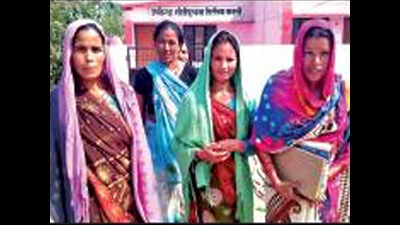- News
- City News
- lucknow News
- Tharu village turns model for safe motherhood
Trending
This story is from April 12, 2018
Tharu village turns model for safe motherhood

ASHAs and Anganbadis of Motipur Kalan village outside the CHC.
SHRAVASTI/LUCKNOW: While family planning targets are still a distant dream in the country, the Tharu community in UP’s Sravasti district has achieved 100% goals, according to an assessment by the district health office.
The report showed that 100% women in Motipur Kalan village in the forests of Katarniaghat were using family planning methods. In contrast, current use of family planning methods by women (in reproductive lifespan of 15-49 years) in India is 53%.The number of women using family planning measures in UP has increased from 43% to 45% in the past decade.
“It is customary in the village for women to head to health centres for family planning methods soon after they have their first baby. They maintain a gap of 3-5 years between children and go in for sterilization after their second baby, irrespective of the sex,” said Dr SK Singh at Sirsiya Community Health Centre.
What makes the Tharu story exemplary is that it comes from the district known for lowest usage of family planning methods in India. In Shravasti, a woman will have at least five children in her reproductive years—the highest in the country.
While health officials claim that Motipur’s achievement is the hard work of field
workers, the community attributes the trend to awareness in women and supporting nature of men.
Motipur’s ASHA Maghi said, “Besides being aware of their needs, the women acquire knowledge and educate husbands.” Against the average of 25 pregnant women per village in UP, this village had just 10 pregnancies at the time of survey.
A matriarchal social structure also supports the women. “Tharu women are more empowered and enjoy greater rights in everyday household decision making,” said Prof Nadeem Hasnain.
The report showed that 100% women in Motipur Kalan village in the forests of Katarniaghat were using family planning methods. In contrast, current use of family planning methods by women (in reproductive lifespan of 15-49 years) in India is 53%.The number of women using family planning measures in UP has increased from 43% to 45% in the past decade.
“It is customary in the village for women to head to health centres for family planning methods soon after they have their first baby. They maintain a gap of 3-5 years between children and go in for sterilization after their second baby, irrespective of the sex,” said Dr SK Singh at Sirsiya Community Health Centre.
What makes the Tharu story exemplary is that it comes from the district known for lowest usage of family planning methods in India. In Shravasti, a woman will have at least five children in her reproductive years—the highest in the country.
Kaushalya (24) was married at 19. She had her first baby at 23 and plans to have her second after 3-4 years. “The ASHA (accredited social health activist) told me to have my baby after two years of marriage, but my husband and I decided to wait for five. All this while, we saved money and built our house,” she said.
While health officials claim that Motipur’s achievement is the hard work of field
workers, the community attributes the trend to awareness in women and supporting nature of men.
Motipur’s ASHA Maghi said, “Besides being aware of their needs, the women acquire knowledge and educate husbands.” Against the average of 25 pregnant women per village in UP, this village had just 10 pregnancies at the time of survey.
A matriarchal social structure also supports the women. “Tharu women are more empowered and enjoy greater rights in everyday household decision making,” said Prof Nadeem Hasnain.
End of Article
FOLLOW US ON SOCIAL MEDIA










